Applicable Exclusion Amount
Just as every person’s estate is subject to the Federal estate tax, each person also receives a fixed dollar amount that can be applied to the amount of estate tax that is actually owed. This credit is known as the “unified credit” or the “applicable exclusion amount” and operates to reduce the amount of federal estate tax that must be paid.
As a credit, the applicable exclusion amount can only be used when the estate actually owes tax. An estate that doesn’t owe any taxes or owes less than the available unified credit simply doesn’t pay any Federal estate tax. The estate does not receive a payment from the I.R.S for the amount of available, but unused credit. The applicable exclusion amount is also personal, meaning that it cannot be shared or transferred between people or estates. This inability to transfer the credit means that any amount which is not used at the time of death simply expires.
Taxable Estate
The taxable estate is the dollar amount that represents the total of the fair market value of everything a person owns at the time of death, less the allowable deductions. Allowable deductions include items such as debts, funeral costs, transfers to qualified charitable organizations, and administration expenses. The value of all property that is transferred to a surviving spouse with United States citizenship is also an allowable deduction, which is often called the “unlimited marital deduction.”
All allowable deductions are subtracted from the deceased’s gross estate to determine the taxable estate. Once the taxable estate is known, the applicable exclusion amount is applied to determine whether any amount of tax must be paid.
Unlimited Marital Deduction and the Taxable Estate
Although the unlimited marital deduction allows a surviving spouse to receive the deceased spouse’s entire estate without incurring any Federal estate tax, it also prevents any use of the deceased spouse’s applicable exclusion amount.
When all of the deceased spouse’s property is transferred to the surviving spouse the deceased spouse is left without a taxable estate. Although there won’t be any tax due, the deceased spouse’s applicable exclusion amount remains unused and will simply expire.
For those who have combined estates significant enough to incur Federal estate tax, this loss of the applicable exclusion amount will most often affect their children. Failure to use the unified credit is not a concern when the property is transferred from the first deceased spouse to the surviving spouse. The concern with failing to use the first deceased spouse’s unified credit comes when the second spouse dies and passes the combined estates of both spouses.
Example Scenario
In 2006 Howard and Marion have individual estates valued at $2,000,000 and two children, Richie and Joanie. These basic facts will be used in both of the following examples, which are designed to show the interaction of the unlimited marital deduction with the applicable exclusion amount and the use of trusts to maximize the tax benefit available when a married couple’s combined estate is passed on to the next generation.
Note that these examples would apply without any regard to which of the two spouses dies before the other.
Estate Values
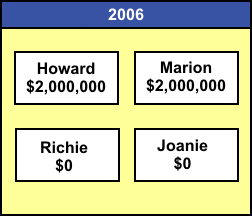
Howard dies in 2007 and, as is typical, uses his will to leave all of his individually owned property to his spouse Marion. The entire $2,000,000 passes to Marion and is combined with her existing $2,000,000 to give her a total estate of $4,000,000. Using the unlimited marital deduction, Howard’s $2,000,000 is subtracted from his gross estate to give him a taxable estate of zero. Without a taxable estate, Howard’s estate does not owe any Federal estate tax. However, without owing any tax, Howard’s $2,000,000 applicable exclusion amount cannot be applied and remains unused.
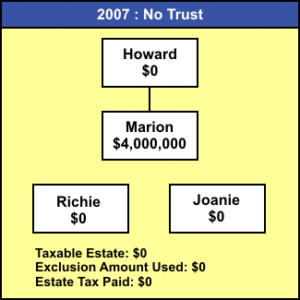
When Marion dies in 2008 her will divides the full amount of her $4,000,000 estate equally between Howard and Marion’s children. The $2,000,000 applicable exclusion amount available in 2008 can be subtracted from her $4,000,000 taxable estate to leave a balance of $2,000,000 for which the Federal estate tax must be calculated. As shown, the final result is $1,550,000 being given to each child.
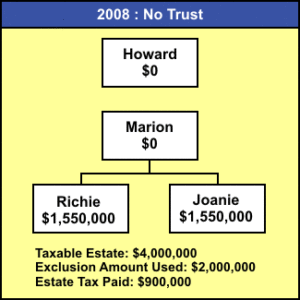
Credit Shelter Trusts
In order to make use of the deceased spouse’s applicable exclusion amount, the deceased spouse must have a taxable estate. However, as all estate property given directly to the surviving spouse is excluded from the taxable estate, it would seem that the only way to create a taxable estate is to give a portion of the estate to someone other than the surviving spouse.
For most people the surviving spouse is the main concern and, although they may also be interested in reducing taxes, they would rather provide for their spouse. Credit shelter trusts provide a means to satisfy both of these goals.
A credit shelter trust creates two interests. One interest belongs to the surviving spouse throughout the duration of his or her life. The other interest typically belongs to the children, who are entitled to receive all property that remains in the trust following the death of the second spouse. For purposes of the Federal estate tax, the most important feature of this trust is its requirement that the someone other the surviving spouse take its property when the surviving spouse later dies. In order to achieve the desired effect, the surviving spouse cannot have any influence or control over who receives the trust property after his or her death.
Basically, by giving the property to someone other than the surviving spouse, the property does not qualify for the unlimited marital deduction and is taxable. Although the trust property is not given directly to the surviving spouse, the surviving spouse is permitted to make use of the trust property for specific purposes throughout the remainder of his or her life. One of the key aspects of the trust is the strict limitation of the surviving spouse’s use to ascertainable standards with clear limitations. The currently acceptable language limits use of the property for the surviving spouse’s “health, maintenance, welfare, or education.” It is also possible to permit annual withdrawals of principal or income based upon amounts with strict limitations.
By also dictating who receives the property and by preventing the surviving spouse from exerting any control over who receives it, the remaining trust property is also not included in the surviving spouse’s estate at the time of his or her later death.
Use of a Credit Shelter Trust
Howard dies in 2007. Rather than use his will to leave all of his individually owned property to his spouse Marion, his will passes the entire $2,000,000 to a credit shelter trust. The trust names Marion as the sole beneficiary during her life, with Richie and Joanie as the beneficiaries of everything that remains in the trust at Marion’s death.
Naming his children as the remainder beneficiaries of this trust is sufficient to create a taxable estate of $2,000,000 which is equal to the applicable exclusion amount during that year. As his taxable estate does not exceed the applicable exclusion amount, Howard’s estate does not pay any Federal estate tax.
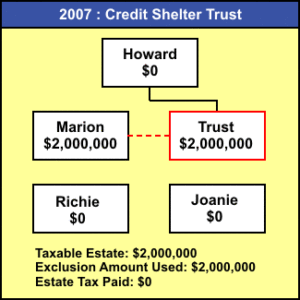
When Marion dies in 2008 her will divides the full amount of her $2,000,000 estate equally between Howard and Marion’s children. With a taxable estate equal to the applicable exclusion amount of $2,000,000 Marion’s estate does not pay and Federal estate tax.
Marion’s death also triggers the end of the credit shelter trust that was created at the time of Howard’s death. The full amount remaining in the trust is given directly to the remainder beneficiaries, Richie and Joanie.
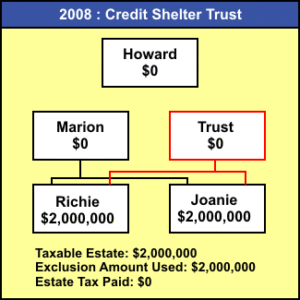
The property held in the credit shelter trust is not includible in Marion’s taxable estate at the time of her death, because it was not directly owned by her and is not includible in her gross estate. Although she could use and benefit from the property, she could not freely withdraw it without limitation and could not direct who would own it.
Although the trust property did not incur any payable tax at the time of Howard’s death, the trust property was already subject to taxation at that time and will not be subjected to the tax when it is formally given to Richie and Joanie.
Using the credit shelter trust in this instance allowed the married couple to pass a total of $900,000 more on to their children.